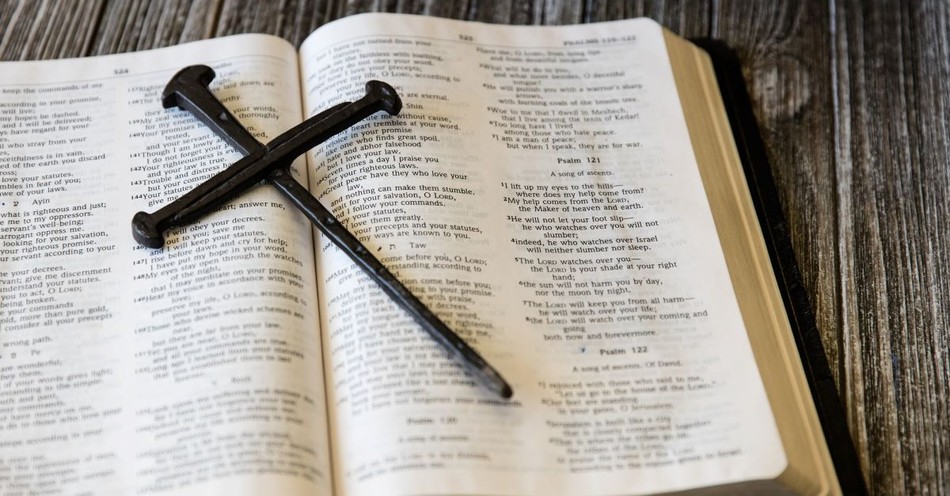'Why Have You Forsaken Me?' Bible Verses
"My God, my God, why have you forsaken me? Why are you so far from saving me, from the words of my groaning? O my God, I cry by day, but you do not answer, and by night, but I find no rest. Yet you are holy, enthroned on the praises of Israel. In you our fathers trusted; they trusted, and you delivered them. To you they cried and were rescued; in you they trusted and were not put to shame. But I am a worm and not a man, scorned by mankind and despised by the people. All who see me mock me; they make mouths at me; they wag their heads; "He trusts in the LORD; let him deliver him; let him rescue him, for he delights in him!" ~ Psalm 22:1-8
"And about the ninth hour Jesus cried out with a loud voice, saying, "Eli, Eli, lema sabachthani?" that is, "My God, my God, why have you forsaken me?" And some of the bystanders, hearing it, said, "This man is calling Elijah." And one of them at once ran and took a sponge, filled it with sour wine, and put it on a reed and gave it to him to drink. But the others said, "Wait, let us see whether Elijah will come to save him." And Jesus cried out again with a loud voice and yielded up his spirit. And behold, the curtain of the temple was torn in two, from top to bottom. And the earth shook, and the rocks were split." ~ Matthew 27:46-51
"And when the sixth hour had come, there was darkness over the whole land until the ninth hour. And at the ninth hour Jesus cried with a loud voice, "Eloi, Eloi, lema sabachthani?" which means, "My God, my God, why have you forsaken me?" And some of the bystanders hearing it said, "Behold, he is calling Elijah." And someone ran and filled a sponge with sour wine, put it on a reed and gave it to him to drink, saying, "Wait, let us see whether Elijah will come to take him down." And Jesus uttered a loud cry and breathed his last." ~ Mark 15:33-37
Why Did Jesus Feel Forsaken on the Cross?
The following is a transcript of the video above featuring Don Whitney:
First of all, that is the first verse of Psalm 22. And I believe that when Jesus uttered, "My God, my God, why have you forsaken me?" That was not only the prayer of his heart but after that when he sank back down, I'm convinced he prayed through that Psalm. Now to some degree that's speculation. We know he prayed the first verse, but that verse, that chapter is the chapter in the Bible prophesying the very event he was experiencing at the moment.
Furthermore, we know that the reason why all seven of the sayings on the cross are very brief is because he'd been beaten nearly to death, he was very dehydrated, he was in agonizing pain. His whole body weight was hanging on the two spikes in his wrist and the one in his feet. So to get enough breath in his diaphragm to utter something, he had to push up on that spike in his feet, and of course, that was excruciating. So he just had enough breath for something very brief. He's in terrible pain. He's of course dying. That's why I believe that it was very brief and he didn't say more than that.
But it's interesting that that is the longest of the seven sayings from the cross, and I believe it is so because he was quoting that first verse and letting us know that's what was on his mind. So I believe he was praying that Psalm.
But I believe that in the time when in his humanity he felt forsaken by the Father, that as he looked around and we have this parade of people coming by that were mocking him, the chief priest and rulers. There are like three different groups of leaders who come by and they mock him. It's interesting that there are multi-sentence statements that they say, and they're prophesied verbatim in Psalm 22.
So those groups are mocking him, the thieves on both sides, though one of them is going to be converted shortly after. At one point, it says in one of the gospels, it says the thieves also, so it's plural, were saying some of the same mocking things that the group at his feet were mocking.
So all these people were mocking. The disciples weren't there. So I think it was a cry that was saying, I know why my apostles, my disciples, in fear have forsaken me. And the scripture said you strike the shepherd the sheep will be separated.
I understand why these robbers would mock me. I understand why the crowds who said Hosanna five days ago, they don't understand. I understand why they would forsake me. I understand why these Jewish leaders would forsake me. But my God, my God, why have you forsaken me?
That was what broke his heart. He understood why all these others, for various reasons would forsake him. But that was what broke his heart because never had he known a moment's time of any sort of separation in his relationship with the Father. So I think this was the great low point, if you will, in his experience on the cross.
But as he prays through that, you get down to Verse 3 in Psalm 22, he says, "Yet you are Holy." So though he was being forsaken by the father, he knew why. It's because God is Holy. I have become sin, and that's why he uttered that cry. God was forsaking him, the perfect, Holy, sinless Jesus. Once my sin was put on Jesus, he was forsaken by the father. So Jesus was forsaken so people like us would not have to be forsaken. We could be received if we come through Jesus to the Father.
Why Did Jesus Say, 'My God, My God, Why Have You Forsaken Me?'
The following is a transcript of the video above featuring Greg Laurie:
You remember those rolling blackouts we were having a number of years ago here in California? I remember one night when all the power went off everywhere. It was kind of eerie. There was no light on. It's just pitch dark. And this was a rolling blackout, but it was in the middle of the day. It's 3:00 in the afternoon. The sun is still out. Suddenly it's pitch black. There's no light anywhere. And then the darkness is pierced by the words of Jesus crying from the cross, "My God, my God, why have you forsaken me?"
What was going on there? Jesus at that moment I believe was bearing the sins of the world. He was dying as a substitute for others. To him was imputed the guilt of our sins, and he was suffering the punishment for those sins on our behalf. In some mysterious way that we can never fully comprehend, during those awful hours on the cross the Father was pouring out the full measure of his wrath against sin, and the recipient of that wrath was God's own son.
God was punishing Jesus as if he had personally committed every wicked deed committed by every wicked sinner. And in doing so, he could forgive and treat those redeemed ones as if they had lived Christ's perfect life of righteousness. This is what we call justification. It is not merely the removal of sin. It is the imputing of the righteousness of Christ into our spiritual bank account. That's what happened when Jesus hung on the cross.
And scripture clearly teaches that there was a moment when the sin of the world was placed on the son. 2 Corinthians 5:21 says, "God made Christ who never sinned to be the offering for our sins." Peter wrote, "He himself bore our sins in His own body on the tree."
But listen, what does Jesus say? "My God, my God, why have you forsaken me?" Ah, we think, a crisis of faith. No, a declaration of fact. Well, what are you saying, that God forsook him? In a sense, yes. Jesus was forsaken so I don't have to be. Jesus entered the darkness so I could walk in the light. Jesus was forsaken that I might be forgiven.
Now when we say Jesus was forsaken, here's what we're saying. As the sin of the world was placed on Christ, the Father, who is holy and cannot look at sin, turned away as he became the recipient of the wrath of God. But because this happened, no one will ever have to think they'll be forsaken of God from this moment forward who calls out to him. Jesus was simply declaring what was taking place in the given moment. But I want you to notice this was not a crisis of faith on the part of our Lord, he was crying out to the father, also fulfilling scripture from Psalm 22, "My God, my God, why have you forsaken me?" Notice it's my God.
What's going to happen when crisis hits your life? And it will. What's going to happen if tragedy comes to your home? And it may. Are you going to cry out to God? Or are you going to ignore God? It's been said, "Character is not made in crisis, it's revealed." It shows what you really are. And some people say, "I'm mad at God. I'm not talking to God. I never want to even communicate with God again." Or you can cry out to God and you can even say, "Lord, I don't get this. I don't understand this. I don't even like this, but I'm looking to you, my God, my God." See the emphasis is not on forsaken, it's on my God. And he called out to his father as he bore the sin of the world.
Photo Credit: ©GettyImages/Ava_Marie
Christianity.com's editorial staff is a team of writers with a background in the Christian faith and writing experience. We work to create relevant, inspiring content for our audience and update timely articles as necessary.



